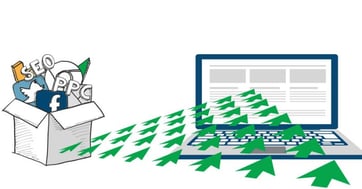Key Highlights
- What PPC for lead generation is and how it works
- Why PPC remains one of the most effective lead generation methods
- Key benefits of PPC for lead generation campaigns
- Proven tips to improve PPC performance and generate qualified leads
- How WSI uses AI to strengthen PPC strategies and reduce lead costs
Editor's Note: This post was originally published in April 2017 and was updated with additional information in October 2023.
Why is PPC good for lead generation? This is a common question among digital marketers. Most marketers are familiar with a traditional sales funnel where leads filter from the top down, encountering various stages of the funnel before converting to customers at the end of the sales process.
However, with the growing impact of social selling and social media, a lead can convert at any stage of the process. As a result, many are beginning to wonder if pay-per-click (PPC), the more “traditional” of digital marketing tactics, is still an effective method for generating qualified leads for businesses.
As a specialist in the 4 pillars of digital marketing - search, site, social, and mobile - I am as passionate about effective online lead generation as everyone else in the WSI network. My deep understanding of this strategy is based on knowledge and practical experience of having applied it successfully to my clients’ (and my own) business! I am, therefore, well placed to talk about why PPC continues to be one of the most outstanding methods for online lead generation.
To generate high-quality leads for your business, setting up a successful lead generation campaign is crucial. Several key elements should be carefully considered when planning such a campaign. The landing page of your PPC campaign should ideally direct to your product or service, but could also be used to generate leads in the form of completed forms or sign up for newsletters.
What is PPC Lead Generation?

PPC lead generation is a digital marketing strategy that uses paid ads to attract potential customers and capture their contact information. PPC stands for pay-per-click, which means you pay only when someone clicks on your ad.
This method allows businesses to reach their target audience quickly and drive qualified traffic to specific landing pages. These pages are designed to encourage users to take action, such as filling out a form, requesting a quote, or subscribing to a newsletter.
Unlike organic marketing, which takes time to build results, PPC provides instant visibility in search engines and social media platforms. It also offers precise targeting options, allowing you to reach people based on keywords, location, interests, or behavior.
Recent benchmarks show that PPC traffic converts 50% better than organic traffic, underscoring its value for capturing high-intent leads. Additionally, around 80% of businesses now use Google Ads or similar PPC platforms to drive growth, highlighting its dominance in the digital marketing mix.
A well-planned PPC lead generation campaign includes clear goals, relevant keywords, compelling ad copy, and optimized landing pages. When executed correctly, PPC can deliver measurable results and a steady flow of high-quality leads for your business.
| PPC traffic converts 50% better than organic traffic, making it one of the most efficient digital channels for generating qualified leads. |
Why You Need PPC for Lead Generation Marketing
Let me elaborate on some of the advantages that PPC has over other lead generation methods:
- It’s measurable: The single greatest advantage of any lead generation method is the ability to measure the exact cost per lead. With traditional above-the-line marketing, this is always challenging. How many leads did a newspaper or radio campaign generate? PPC, whether paid search, display, or social ads, all have a method to be able to track a conversion. It could be a form filled in, an email, or a phone call, but you can tell when you have that lead firmly in the first level of your funnel, and you know exactly how it got there. That allows you to see what the cost per lead of each strategy is and adjust your path accordingly. According to WordStream’s 2025 Google Ads Benchmarks, the average cost per lead (CPL) across industries is $70.11.
- It’s targeted: Paid search, social, and display marketing all require you to select where, when, and whom you want to show your ads to. You can select people based on their age, what they typed in as a search on Google, what type of content they are reading, or even if they have kids or not! Seth Godin says, “Everyone is not your customer,” and this is a key thing to understand in marketing. By knowing your target market, you can reach them with an idea that resonates with them. Being able to target exactly the person who is your ideal customer can reduce your cost per lead and increase your overall ROI.
- It’s evolving: Selling advertising is actually how most of the large internet companies make their money, with Facebook and Google being at the forefront of this. In fact, the majority of Google's revenue is generated through advertising and from ad clicks on the Google search page. That figure doesn’t even include revenue generated from the wider Display Network or YouTube! That is $224 billion from people clicking on ads after doing a search on Google. Since these ad platforms are their money makers, it makes sense for these companies to spend a lot of time and effort developing their ad platforms to make it easier and more beneficial for advertisers to spend money with them. For advertisers, this means that you have a constantly evolving tool that offers several unique benefits.
- You can reach the same people again: Whether you call it remarketing or retargeting, the ability to show ads to people who have already interacted with you is powerful. There is an old marketing adage called the Rule of 7 – a potential customer needs to have 7 touchpoints or exposures to your brand before they take action. Now, what if you could accelerate this process by showing your brand to people who had already been on your website? That’s remarketing. Some companies have had absolutely extraordinary results with remarketing, both on display platforms and on social. What is clear is that PPC has given us new and unique ways to stay top-of-mind.
| Track your cost per lead (CPL) and use that data to adjust your bidding and targeting. This helps improve ROI and ensures your ad spend stays efficient. |
Benefits of PPC for Lead Generation

Instant Visibility
PPC ads place your business at the top of search results right away. This helps you reach potential customers who are actively looking for your products or services.
Highly Targeted Reach
You can focus your ads on specific keywords, locations, demographics, and user interests. This ensures your budget is spent on attracting qualified leads who are more likely to convert.
Measurable Results
PPC provides clear data on impressions, clicks, conversions, and cost per lead. You always know what is working and can adjust your campaigns based on performance.
Budget Control
You decide how much to spend each day or month. PPC lets you set limits and adjust your budget anytime, making it flexible for both small and large businesses.
Faster Lead Generation
Unlike organic methods that take time to show impact, PPC delivers leads soon after a campaign launches. It is ideal for businesses that need quick results.
Better Conversion Opportunities
A well-optimized PPC campaign directs users to targeted landing pages with clear calls-to-action. This increases the chances of turning visitors into leads. The average search ad click-through rate (CTR) is 6.42%, meaning well-targeted campaigns consistently attract engaged users ready to take action.
Useful Audience Insights
Campaign data reveals how users search, what they click, and which ads perform best. These insights help refine both your paid and organic marketing strategies.
Strong ROI Potential
When managed well, PPC can generate a steady flow of high-quality leads at a controlled cost. You pay only when someone shows real interest by clicking your ad.
Tips for an Effective PPC Lead Generation Strategy
Define Clear Goals
Set measurable objectives such as cost per lead or conversion rate. Clear goals guide your targeting, messaging, and budget decisions.
Target the Right Audience
Use detailed targeting options to reach users most likely to convert. Focus on demographics, search intent, and location to improve lead quality.
Choose High-Intent Keywords
Select keywords that show strong intent to buy or enquire. Phrases like “get a quote” or “book a consultation” attract users closer to conversion.
Write Compelling Ad Copy
Create ads that address your audience’s needs. Use clear headlines, highlight your value, and include a call to action that encourages clicks.
Optimize Landing Pages
Your landing page should match your ad message and have one clear goal. Keep it fast, simple, and focused on getting users to take action.
Use Ad Extensions
Add extensions such as site links, callouts, and phone numbers to make your ad more informative. They help increase visibility and engagement.
Track Conversions Accurately
Set up conversion tracking to measure performance. Knowing which keywords and ads deliver leads helps refine your strategy.
Test and Refine Regularly
Run A/B tests on ad copy, visuals, and landing pages. Use results to improve performance and reduce wasted spend.
Adjust Bids Based on Performance
Increase bids for keywords that convert well and reduce or pause underperforming ones. This keeps your budget focused on what works.
Align PPC with Other Marketing Channels
Combine PPC insights with SEO and content marketing efforts. This creates a stronger, more consistent lead generation strategy.
Generating Leads Through PPC

Your PPC lead generation strategies are what set you apart from your competitors. In order to get more leads with PPC, you need to focus on the search intent of your target. The benefit of PPC, in this case, is that you can set up your marketing campaign to limit your PPC audience to only those who are ready to purchase. Effective lead generation focuses on the ROI of your PPC campaigns over the number of leads you get.
Is PPC lead generation?
PPC is indeed a method of lead generation. It is a digital advertising strategy where advertisers pay a fee each time their ad is clicked. Instead of earning traffic organically, PPC allows businesses to buy visits to their sites. Platforms like Google Ads and Bing Ads offer PPC advertising, often appearing at the top of search results.
When effectively targeted, these ads can drive potential customers to actively search for products or services, making them quality leads. However, it's essential to note that while PPC can generate leads, its success in converting those leads depends on several factors, including the landing page experience, the ad's relevancy, and the product or service's inherent appeal.
What is the difference between PPC and lead generation?
PPC and lead generation are digital marketing strategies, but they serve different primary purposes and involve different processes. PPC is a form of online advertising where advertisers pay a fee each time their advertisement is clicked. It is essentially a way of buying visits to a site rather than attracting them organically. Platforms like Google or Facebook facilitate this type of advertising.
On the other hand, lead generation is a broader strategy aimed at attracting and converting potential customers into individuals who have indicated an interest in a company's product or service. This can be achieved through various means, including content marketing, email campaigns, SEO, and, indeed, PPC. So, while PPC is specifically about paying for clicks to drive traffic, lead generation encompasses a wider range of tactics to capture and nurture potential customers. PPC is just one of those tactics.
Use AI with WSI to Improve PPC Performance
WSI uses AI tools to make PPC lead generation campaigns more efficient and effective. Smart bidding powered by machine learning adjusts bids in real time based on user behavior, time of day, and device. AI also helps identify high-performing keywords, refine ad copy, and forecast which audiences are most likely to convert. With WSI, you get the right mix of AI automation and expert strategy to improve targeting, improve conversions, and reduce lead costs.
| Businesses that use AI-powered bidding and audience optimization can reduce their lead acquisition costs by up to 30% while improving ad performance. |
Connect with a WSI Expert to Launch a High-Performing PPC Campaign
Lead generation can be a business’s largest stumbling block, but the above points show that using PPC as a lead generation tactic is a sound way to fill that sales funnel with qualified, quality leads.
Talk to us, and learn the many benefits of PPC for lead generation. Accelerate your PPC campaign's performance today!
FAQs about PPC for Lead Generation#1. What is PPC lead generation? PPC lead generation uses paid ads to attract potential customers and collect their information through landing pages or forms. It helps businesses reach people who are actively looking for their products or services. #2. How does PPC help generate qualified leads? PPC campaigns allow you to target specific keywords, locations, interests, and demographics. This ensures your ads reach people most likely to become customers, improving lead quality and conversion rates. #3. Is PPC better than SEO for lead generation? Both work well together. PPC delivers instant visibility and quick results, while SEO builds long-term credibility and organic traffic. Many businesses use both to maintain a steady flow of leads. #4. How much should I spend on a PPC lead generation campaign? Your budget depends on your goals, industry, and competition. A good starting point is to test a smaller budget, measure results, and then increase investment in high-performing campaigns. #5. How do I know if my PPC campaign is working? You can track performance through key metrics such as click-through rate, cost per lead, and conversion rate. Regular monitoring helps you refine targeting and improve results. #6. What makes a PPC landing page effective? An effective landing page matches the ad message, loads quickly, and includes a clear call-to-action. It should focus on one goal, such as filling out a form or booking a consultation. #7. Can PPC help small businesses with lead generation? Yes. PPC is flexible and can fit any budget. Small businesses benefit from precise targeting and measurable results, helping them compete with larger competitors online. #8. How quickly can I see results from a PPC campaign? PPC can start generating leads almost immediately after launch. The quality and consistency of results improve over time with ongoing optimization. With WSI, your PPC for lead generation campaigns is continually refined to reach the right audience, maximize conversions, and deliver measurable business growth. |






